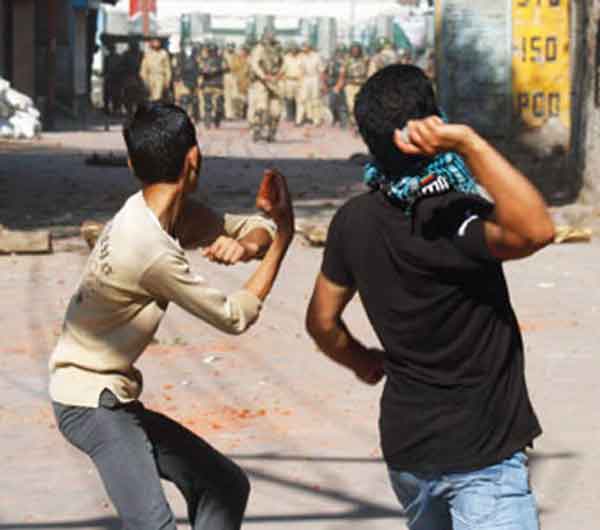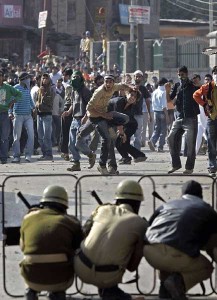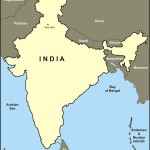The much-awaited report of the Kashmir-interlocutors, appointed by the Union Home Ministry, is now out in the public domain. 176-page long, it has evoked mixed reactions. The interlocutors have recommended reviewing of all central Acts and Articles of Indian Constitution, extended to Jammu and Kashmir after the 1953. Home Minister P Chidambaram wants an informed debate on the report. Personally, I am disappointed about it, though the erudite leader of the interlocutors-team was my Boss when I worked for The Times of India.
I have two basic problems with the report. First, the report has paid scant attention to the role of foreign mercenaries and Pakistan in aggravating the crisis in the state. It talks of a solution which has nothing to do with the people in Pakistani-occupied Kashmir, except suggesting that they are most welcome to join their brethren on this side of Kashmir. It seems that the team will not mind if they cross over to India and settle here permanently by surrendering their territory to Pakistan!
The separatists want Kashmir not only to be the sole preserve of the Muslims, but be guided by a particular brand of Islam. They want non-Muslims, if at all they are allowed to live, to be second-class citizens.
Secondly, the interlocutors have scrupulously overlooked the most disturbing feature in Kashmir today. And that feature is the systematic “Islamaisation” of the state. In my humble opinion, the problem in Kashmir is no more about “azadi” but about the attacks on the age-old Kashmiriyat and genuine secularism in the state.
It is not that the Islamists, and most of them being separatists, constitute the majority. Fortunately, even today the majority of the people in the State would like to remain part of India, as evident by an opinion poll conducted not long ago by Chatham House (UK) on either side of the Line of Control (LoC) in Jammu and Kashmir. The poll showed that only 2 per cent of the people of J&K want to be part of Pakistan. As many as 58 per cent of the 3,774 polled, in J&K and Pakistan-occupied Kashmir (PoK), are ready to accept the LoC as a permanent “soft border”—an idea dating back to the famous “Simla Agreement” of 1972 between Indira Gandhi and Zulfiqar Ali Bhutto.
Regrettably, however, the fact remains that the majority in Jammu and Kashmir, still believing in Kashmiriyat, are being forced to be “silent” as it has been betrayed by inept governments both in Srinagar and in Delhi. It may be noted that over the years, Kashmir has been witnessing, as the Bangladeshi scholar Abu Taher Salahuddin Ahmed rightly says, three principal trends—Indianness, Kashmiriness and Muslimness. The Indianness has been propagated by the federal forces, be it the Central Government or national parties such as the Congress and the BJP. However, the problem in the State is due to the tussle between those believing in Kashmiriness and those being loyal to Muslimness.
Kashmiriness is an offshoot of the much-talked about Kashmiriyat, which, while co-existing with Indianness, talks of inclusive or composite identity, binding all groups together and not offending any section. No wonder why despite being a Muslim-majority area, beef-eating, until recently, was virtually non-existent in the valley.
Of course, some scholars now point out that there were always differences between Muslims and Hindus (essentially Kashmiri Pundits) in their interpretation of the concept of Kashmiriyat. But undeniably, the concept did promote coexistence. Majority of the Kashmiri Muslims, therefore, had no problems with the Hindus or for that matter with the Buddhists. And, the key factor to the success of Kashmiriyat was the fact that the overwhelming majority of the Kashmiri Muslims believed in Sufism or what is said the “Rishi tradition” that believed in saint and shrine worships. Of course, it was greatly facilitated by the fact that as was the case in other parts of the subcontinent, Muslims were essentially converts from the fold of Hinduism.
In contrast, the Muslimness always advocated the exclusive concepts in the valley. Promoted by the Wahhabi and Ahl-i-Hadith sects, this school relies more on the authority of the Quran and Hadith and is totally opposed to the concept of saints and shrine worships. This tradition or school has always been in minority in Kashmir, but has always been there. It was behind organisations such as the Muslim Conference and the Kashmir Jamaat (KJ).
Going back to pre-1953 days will also mean that ordinary Kashmiris will not have the opportunity to knock at Indian judiciary, one of our great institutions, some failings here and there notwithstanding. That will also mean that our Election Commission will not be able to ensure clean elections which the state has witnessed in recent years.
Needless to say that almost all the separatists and terrorists, including the so-called moderate elements like the Hurriyat Conference, belong to the school of Islamness. They have nothing to do with India. They have nothing to with Kashmiriyat either. For them, Kashmiri as a distinct and proud language does not exist. No wonder why Kashmiri children are no more encouraged to speak, read and write in their mother-tongue; they are forced to adapt to Urdu. Against this background, no amount of appeasement will ever impress them to stay with India. They believe in the theory of “Kashmir for Muslims” and their essential argument is that they cannot co-exist in a Hindu-dominated India.
All the separatist leaders would love Kashmir to be run by Sharia, not by democratic tenets. They want mosques or mosque-approved leaders, not any elected representatives, to control their lives. Just see the roles the mosques are playing in aggravating the crisis in Kashmir today. It is the loudspeakers from mosques that instigate people to gather and agitate. It is in the mosques that the terrorists take shelter, knowing pretty well that the security forces will not dare enter there. Because, the Religious Institutions (Prevention of Misuse) Act, 1988 is applicable to all over India except in Jammu and Kashmir, thanks to the Article 370.
In other words, the separatists want Kashmir not only to be the sole preserve of the Muslims, but be guided by a particular brand of Islam. They want non-Muslims, if at all they are allowed to live, to be second-class citizens. This is the precise reason why they want azadi from a democratic India, which, otherwise, houses 130 million proud Muslims. And what tactics they are adopting? Experts analysing arsons and violence all over the world have pointed out a dangerous trend of the dominant political and media elites easily falling prey to the demands of the trouble-makers in finding virtues in their demands, howsoever unreasonable and illogical those may be. These elites simply do not have patience and perseverance to discover the truth that a trigger group of just 15 to 20 persons can always instigate a mob of thousands to violence. As a part of this tactic, these instigators often hire women and children during protests so as to ensure that today’s 24×7 media will highlight their pictures all over the world and create necessary commotions that can pressurise the government into taking decisions in their favour. No wonder why these days a section of mainstream media, including some noted TV channels, in India has become the greatest ally of the Kashmiri agitators in finding virtues in their demands.
Unfortunately, the interlocutors have displayed the similar trends in their report. They glorify the “separateness” of the Kashmir and would like Article 370 of the Indian Constitution to be made a permanent feature. They recommend that Delhi should have no role in Kashmir other than the ones that involve national security issues. They also find it politically correct to suggest that once the pre-1953 status of Kashmir is restored (whereby, except foreign affairs, defence and communication, Delhi’s writs will not run in Srinagar), all problems will be over. In effect, it will mean that thousands and thousands of crores that we ordinary tax-payers pay every year for the people of Jammu and Kashmir will be spent without any accountability. It is not that it is accountable now, but at least the country has the formal power to scrutinise. That this formal power is not being used judiciously is a different story. Going back to pre-1953 days will also mean that ordinary Kashmiris will not have the opportunity to knock at Indian judiciary, one of our great institutions, some failings here and there notwithstanding. That will also mean that our Election Commission will not be able to ensure clean elections which the state has witnessed in recent years.
Whatever one may say, the truth is that Article 370 is an instrument of appeasement. And appeasement, by its very nature, is like a pain-killer tablet. It suppresses the pain for the time being but does not stamp out the disease. On the other hand, it further encourages those appeased to demand more and more. And worst, it legitimises the “separateness” of those appeased. It gives them the feeling that they are different from the rest. And with the passage of time, the situation will reach a point when they will succeed in completely separating themselves from the appeasers. Unfortunately, Kashmir is undergoing this process, which we can neglect at our peril.






